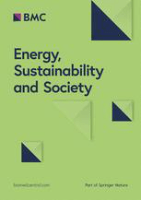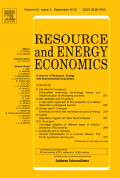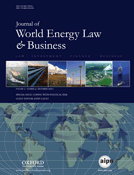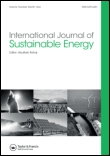
Progress in Energy
Scope & Guideline
Exploring New Frontiers in Energy Science and Application
Introduction
Aims and Scopes
- Energy Transition and Decarbonization:
The journal emphasizes research that supports the transition to low-carbon energy systems, including managed decarbonization strategies and the role of renewable energy sources. - Technological Innovations in Energy Systems:
A significant focus is placed on the development and optimization of energy technologies, including advances in electrochemical cells, batteries, and renewable energy systems. - Energy Policy and Governance:
The journal explores the implications of energy policies and governance structures, particularly in relation to energy justice, economic resilience, and sustainable development. - Socio-Economic Impacts of Energy Systems:
Research addressing the socio-economic dimensions of energy systems, including community impacts and participatory approaches to energy justice, is a core area of focus. - Sustainability and Environmental Considerations:
The journal promotes studies that assess the environmental impacts of energy technologies and strategies for sustainable resource management, including carbon capture and utilization.
Trending and Emerging
- Machine Learning and AI in Energy:
Research utilizing machine learning and artificial intelligence for energy system optimization and innovation is on the rise, reflecting the growing intersection of technology and energy. - Electric Vehicle Infrastructure and Policy:
There is an increasing focus on electric vehicle (EV) charging infrastructure and associated policies, driven by the global push for cleaner transportation solutions. - Energy Justice and Equity:
Emerging themes in energy justice and equity highlight the need for inclusive energy policies that address the needs and rights of marginalized communities. - Integration of Renewable Energy Sources:
Research on the integration of diverse renewable energy sources into existing grids, including challenges and strategies for effective implementation, is becoming more prevalent. - Climate Resilience and Extreme Weather Preparedness:
Recent studies emphasize the importance of climate resilience in energy systems, particularly in light of increasing extreme weather events impacting electricity grids.
Declining or Waning
- Traditional Fossil Fuel Technologies:
There is a noticeable decrease in publications focused on traditional fossil fuel technologies, as the journal shifts its emphasis towards renewable energy and sustainable alternatives. - Niche Energy Storage Solutions:
Research on niche energy storage solutions, such as specific conventional battery technologies, has waned as broader, more integrative approaches to energy storage gain traction. - Conventional Energy Efficiency Measures:
The focus on conventional energy efficiency measures is decreasing, with more attention being directed towards innovative and transformative energy solutions.
Similar Journals

International Journal of Exergy
Decoding the Science of Energy EfficiencyThe International Journal of Exergy, published by InderScience Enterprises Ltd, stands as a vital resource in the field of energy research, particularly focusing on the innovative utilization and sustainable management of energy resources. With an ISSN of 1742-8297 and an E-ISSN of 1742-8300, this journal serves as a platform for disseminating groundbreaking research from 2004 to 2024. It has been recognized for its scholarly contributions, earning a category ranking of Q3 in Energy (Miscellaneous) for 2023 and holding a Scopus rank of #44 out of 73 in the General Energy category, positioning it in the 40th percentile of its peers. Although under a traditional subscription model, the journal attracts a diverse readership committed to exploring the intricacies of exergy and efficiency in energy systems. Engaging with cutting-edge studies, original research, and reviews, International Journal of Exergy is indispensable for researchers, professionals, and students alike who seek to advance their understanding and applications in energy technology and sustainability.

Journal of Power Technologies
Empowering Innovation in Energy SolutionsJournal of Power Technologies is a prestigious academic journal dedicated to advancing the field of power engineering, specifically focusing on innovative technologies and methodologies related to energy production, transmission, and efficiency. Published by the renowned Warsaw University of Technology, Institute of Heat Engineering, this journal is committed to disseminating high-quality research that addresses the challenges and opportunities in the energy sector. Although currently not open access, the journal provides extensive subscription options for access to its comprehensive range of articles. With an emphasis on original research, case studies, and reviews, the Journal of Power Technologies serves as a vital resource for researchers, practitioners, and students alike, aiming to shape the future of sustainable power systems and contribute significantly to the global energy discourse. The journal continues to foster an academic environment where innovation in power technology is highlighted and celebrated, supporting the ongoing quest for sustainable energy solutions.

Frontiers in Energy
Advancing Knowledge in Energy Systems for a Sustainable World.Frontiers in Energy is a distinguished journal published by HIGHER EDUCATION PRESS, focusing on the dynamic and rapidly evolving field of energy engineering and power technology. Established in 2011, the journal serves as a pivotal platform for disseminating innovative research findings and practical applications that address critical challenges in energy systems. With an impressive Q2 ranking in 2023 and a Scopus rank of 81 out of 272 in the discipline, it highlights the journal's influential impact within the academic community, reflecting its commitment to high-quality research. Based in Beijing, China, the journal aims to promote open and accessible scientific discussion, facilitating collaboration among researchers, professionals, and students alike. As an open access publication, Frontiers in Energy ensures that valuable knowledge is readily available to a global audience, effectively contributing to advancements in sustainable energy solutions. Join the forefront of energy innovation by engaging with cutting-edge research that shapes our energy future.

Energy Sustainability and Society
Connecting research and practice for a sustainable energy landscape.Energy Sustainability and Society is a leading open-access journal published by BMC, focusing on the critical intersections of energy sustainability and societal impacts. With an impressive Impact Factor and notable rankings—including Q1 in both Development and Energy Engineering, as well as Q2 in Renewable Energy, Sustainability, and the Environment—this journal serves as a pivotal platform for researchers, professionals, and students exploring innovative solutions to energy challenges. Since its inception in 2011, the journal has consistently provided high-quality research and insights, contributing significantly to the fields of energy policy, renewable technologies, and sustainable development. Access options are fully open-access, ensuring that research is freely available to foster collaboration and knowledge-sharing across disciplines. The journal’s commitment to publishing cutting-edge research underscores its importance in shaping a sustainable energy future.

RESOURCE AND ENERGY ECONOMICS
Transforming Insights into Actionable Energy StrategiesRESOURCE AND ENERGY ECONOMICS is a premier academic journal published by ELSEVIER, specializing in the intricate fields of economics and econometrics with a particular focus on the intersection of resource management and energy policy. Established in 1993, the journal has been a vital platform for scholars and professionals, contributing to significant advancements in the understanding of economic aspects surrounding natural resources and energy systems. With an impressive impact factor and ranking in the top quartile (Q1) of its category, it is recognized for its rigorous peer-reviewed research that informs both academic inquiry and practical applications in the industry. The journal is based in the Netherlands and caters to a global audience, fostering interdisciplinary discussions aimed at addressing pressing environmental and economic challenges. Accessible primarily through institutional subscriptions, RESOURCE AND ENERGY ECONOMICS continues to shape the discourse in its field, making it an essential read for researchers, policymakers, and practitioners striving for innovative solutions in resource and energy economics.

Economics of Energy & Environmental Policy
Connecting Economic Principles with Environmental Impact.Economics of Energy & Environmental Policy is a prestigious journal published by the International Association for Energy Economics, focusing on the intersection of economic principles and energy/environmental policy. Since its inception in 2012, this journal has provided a critical platform for researchers, professionals, and students interested in the multifaceted impacts of energy economics on society and the environment. With an impressive performance reflected in its 2023 Scopus rankings—Q2 in key areas such as Economics and Econometrics, Energy, and Management, Monitoring, Policy and Law—this journal not only contributes to academic discourse but also informs policymaking and industry practices. Although published as a traditional journal, its contents are vital for addressing contemporary challenges in energy management and environmental sustainability. Located in Cleveland, Ohio, the journal is committed to fostering innovation in energy economics, enhancing our understanding of the socio-economic dimensions of energy use, and promoting effective environmental policymaking.

Journal of World Energy Law & Business
Fostering Interdisciplinary Insights in Energy LawJournal of World Energy Law & Business is a premier academic journal published by Oxford University Press, focused on the intersection of energy law, business, and environmental policy. Established in 2012, this journal provides a critical platform for scholars, practitioners, and policymakers to discuss pressing energy issues on a global scale, fostering interdisciplinary dialogue and innovation. With an impactful 2023 Quartile Ranking of Q2 in Law and Q3 in Energy and Management, the journal plays a vital role in shaping discourse surrounding legal frameworks, regulatory challenges, and business practices in the energy sector. Researchers and professionals in the field will find valuable insights in its thoughtfully curated articles, which reflect current trends and developments through rigorous scholarship. Despite the absence of open-access options, the journal remains an essential resource for those who seek to navigate the complexities of energy law and policy.

Problemele Energeticii Regionale
Illuminating Pathways to Renewable Energy SolutionsProblemele Energeticii Regionale is a notable academic journal focused on the field of energy engineering and sustainable energy solutions, published by the Institute of Power Engineering, Academy of Sciences of Moldova. Since its inception in 2005, this Open Access journal has become a significant platform for disseminating research and innovations in various energy-related domains, including renewable solutions, fuel technology, and energy sustainability. While its impact factor metrics suggest it currently resides in the Q4 quartile category across multiple scopes—such as Energy Engineering, Power Technology, and Renewable Energy—it provides critical insights that can pave the way for advancements in regional energy challenges. Researchers, professionals, and students alike will find this journal an essential resource for understanding and contributing to the ongoing discourse in the energy sector. With its commitment to accessibility and knowledge sharing, Problemele Energeticii Regionale aims to foster a collaborative and informed community focused on energy innovation and sustainability.

International Journal of Sustainable Energy
Shaping the Future of Energy through ResearchInternational Journal of Sustainable Energy is a premier peer-reviewed journal published by TAYLOR & FRANCIS LTD that serves as a vital platform for the dissemination of innovative research in the field of sustainable energy. With an ISSN of 1478-6451 and an E-ISSN of 1478-646X, this journal has established a significant reputation, currently ranked in the Q2 category across multiple disciplines such as Energy (miscellaneous), Fluid Flow and Transfer Processes, and Fuel Technology, reflecting its commitment to high-quality academic contributions. The journal has been Open Access since 2022, ensuring that research is freely accessible to a global audience, fostering collaboration and knowledge sharing. Positioned in the United Kingdom, the journal strives to address the critical challenges surrounding renewable energy and sustainability, appealing to researchers, professionals, and students alike. The Scopus rankings further enhance its credibility, showcasing its impact in the field with notable percentiles across various energy-related categories. With converged years from 2003 to 2024, the International Journal of Sustainable Energy remains a cornerstone for innovative research that seeks to pave the way towards a more sustainable future.

AIMS Energy
Fueling Knowledge, Powering SolutionsAIMS Energy is a leading academic journal published by the American Institute of Mathematical Sciences (AIMS), dedicated to advancing the field of energy research. With a strong commitment to Open Access since its inception in 2013, this journal offers a platform for researchers, professionals, and students to share innovative findings and enrich the discourse in crucial areas such as Energy Engineering and Power Technology, Fuel Technology, and Renewable Energy, Sustainability and the Environment. Recognized for its quality, AIMS Energy holds a respectable impact with a Q3 ranking in multiple categories as of 2023, and it ranks within the top half of its peers in the Scopus database. The journal's objective is to disseminate high-quality research that addresses contemporary challenges in energy and offers sustainable solutions. By fostering collaboration and discussion among various stakeholders, AIMS Energy plays a critical role in shaping the future of energy technologies and policies.